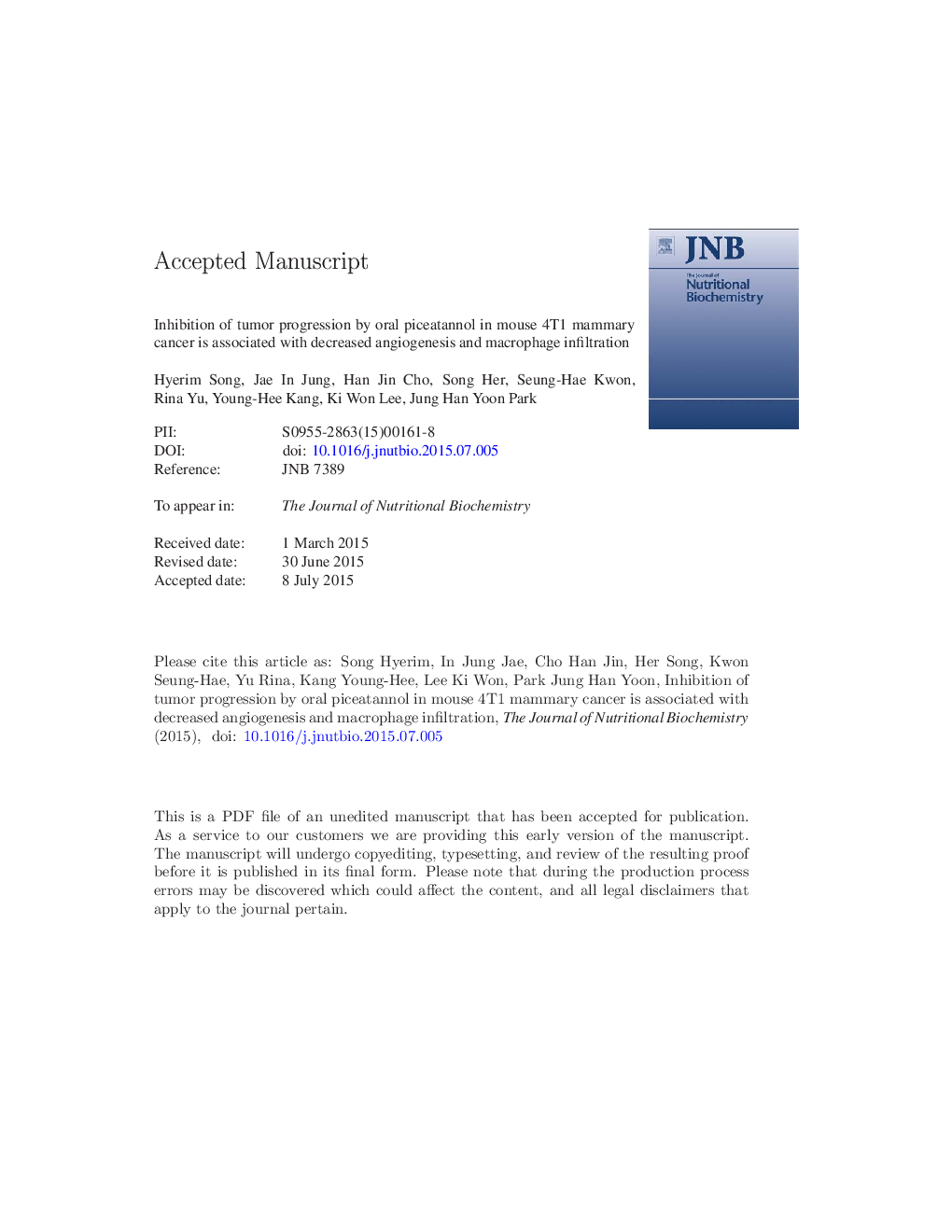| Article ID | Journal | Published Year | Pages | File Type |
|---|---|---|---|---|
| 8336844 | The Journal of Nutritional Biochemistry | 2015 | 33 Pages |
Abstract
Piceatannol, a polyphenol which exhibits anticancer activities, is found in grapes, red wine and berries. It has been shown to inhibit several transcription factor pathways. The present study was conducted to determine whether oral administration of piceatannol inhibits mammary tumor progression. 4T1 mammary carcinoma cells were injected into the mammary fat pad of syngeneic female BALB/c mice. Starting 1 day later, piceatannol (10- or 20-mg/kg body weight/day) was administered by oral gavage for 30 days. Piceatannol treatment reduced tumor growth. In tumor tissues, piceatannol treatment reduced the expression of transcription factors P-NFκB p65, P-STAT3 and HIF-1α and multiple proteins involved in regulation of cell cycle progression (Ki67, cyclin D1, cyclin A, CDK2, CDK4), angiogenesis (VEGF-A, VEGFR-2, VE-cadherin, CD31) and lymphangiogenesis (VEGF-C, LYVE-1), as well as macrophage infiltration. Piceatannol significantly increased apoptotic cells and expression of both Bax and cleaved caspase-3 but reduced Bcl-2 expression in tumor tissues. In addition, piceatannol reduced the number and volume of pulmonary tumor nodules and expression of MMP-9 in both lung and tumor. It also reduced tissue levels of cytokines/chemokines, including M-CSF and MCP-1. In vitro results revealed that piceatannol inhibited migration of 4T1 cells and monocytes, as well as secretion of MCP-1 and M-CSF by 4T1 cells. 4T1 cell-conditioned medium stimulated monocyte migration, which was suppressed by a CCR2 antibody. These results indicate that alteration in tumor microenvironment (macrophages, transcription factors, etc.) is an important mechanism by which piceatannol inhibits tumor proliferation, angiogenesis and lymphangiogenesis, leading to suppression of mammary tumor growth and metastasis.
Keywords
M-CSFHIF-1αMVDMCP-1iNOSMMP-9COX-2VEGFRCD31TREM-1TIMP-2FBSDMEMPiceatannolCDKTAMsDulbecco′s modified Eagle′s mediumSTATtumor angiogenesisMicrovessel densityEnzyme-linked immunosorbent assayELISATUNELBreast cancerfetal bovine seruminducible nitric oxide synthaseCytokinesCyclooxygenase-2Vascular endothelial growth factorVascular Endothelial Growth Factor (VEGF)Matrix metalloproteinase-9macrophage colony-stimulating factorMacrophagesTumor-associated macrophagesSignal transducer and activator of transcriptionplatelet endothelial cell adhesion molecule-1hypoxia-inducible factor-1 alphapolymerase chain reactionPCRMonocyte chemotactic protein-1cyclin-dependent kinaseVEGF receptortriggering receptor expressed on myeloid cells-1
Related Topics
Life Sciences
Biochemistry, Genetics and Molecular Biology
Biochemistry
Authors
Hyerim Song, Jae In Jung, Han Jin Cho, Song Her, Seung-Hae Kwon, Rina Yu, Young-Hee Kang, Ki Won Lee, Jung Han Yoon Park,
